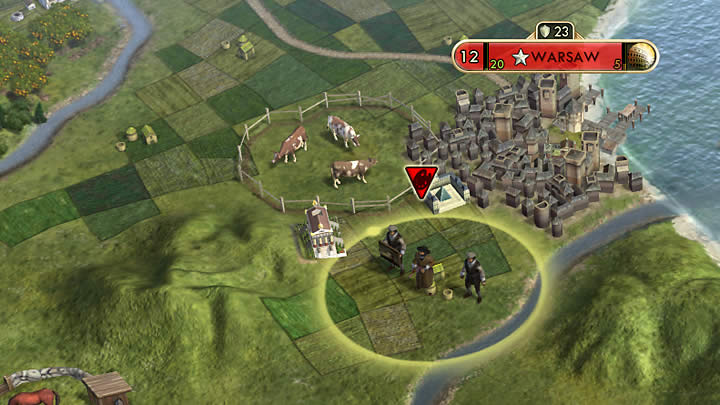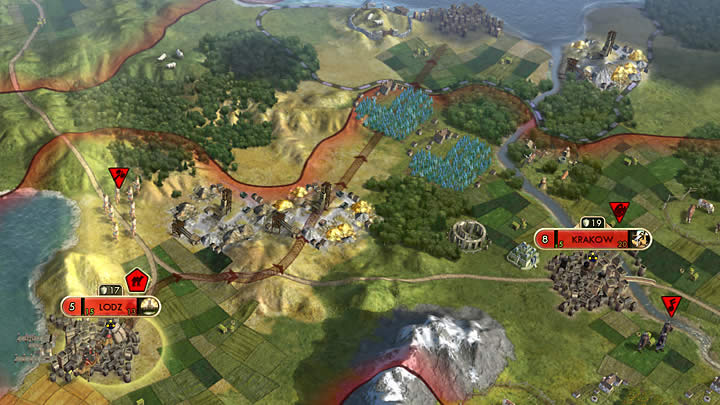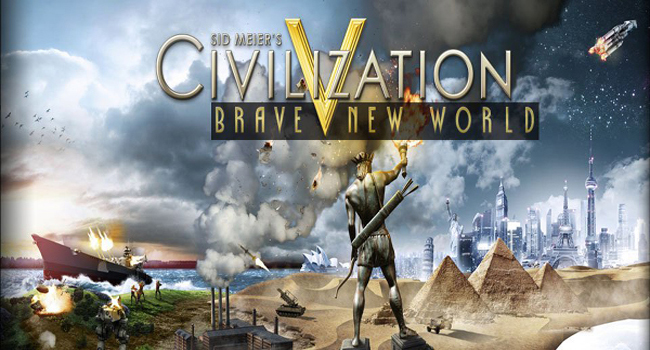Sid Meier’s Civilization V: Brave new World is the second expansion and latest in a long line of DLC for the main game. Developed by Firaxis Games and published by 2K games for PC and Mac, it adds multiple elements to the already substantial game but does not require Gods and Kings, which is now more or less relegated to being a Civilization pack, rather than the mostly crucial expansion it was once regarded as.
 Brave New World is the best kind of expansion; it takes what the original game and its first expansion achieved, and both builds upon existing mechanics, as well as introducing new ones. While it adds the world congress, international trade routes and tourism as the three major new features, it also tweaks religion, social policies, and your spy network.
Brave New World is the best kind of expansion; it takes what the original game and its first expansion achieved, and both builds upon existing mechanics, as well as introducing new ones. While it adds the world congress, international trade routes and tourism as the three major new features, it also tweaks religion, social policies, and your spy network.
Of the new mechanics, international trade routes are the one that you’ll first encounter. Added to animal husbandry (and sailing) it is not only viable as a first line of research it also is quite the money maker for the early game. The basis is that you can send either caravans or cargo ships, over land or sea respectively, to the various erected cities in the game. Going to city-states or other Civilisations (Civs) will grant you, at the very least, gold, and possibly religious pressure, science, tourism and favour with the AIs.
Trade routes also have a more inwardly focused ability unlocked by the home city of any cargo ship or caravan. Once you have a granary or workshop built, you can transfer a small portion of the city’s food or production to another of your cities. It helps set up cities at a much faster rate than you’ll have previously been able to do, crucially, without you having to spend gold to get a newly found city up on its own two feet.
 The World Congress (an early United Nations) comes into play after someone discovers the printing press as well as met each and every other living Civ in the game. That Civ then become the host, gaining a few more delegates (votes) for anything that is proposed in any of the semi-regular congresses. Two proposals may be made at each congress, one by the host and one from the civ with the most delegates. Proposals vary in theme but they all carry a weight in the right circumstances. Ranging from banning specific luxuries, trade embargos and deciding world religions or ideologies, there are quite a few choices to make. Some of the more grand proposals, such as the International Games let you sink production into a project in order to gain benefits that everyone can work towards; granting a substantial prize to whomever commits the most resources to the project.
The World Congress (an early United Nations) comes into play after someone discovers the printing press as well as met each and every other living Civ in the game. That Civ then become the host, gaining a few more delegates (votes) for anything that is proposed in any of the semi-regular congresses. Two proposals may be made at each congress, one by the host and one from the civ with the most delegates. Proposals vary in theme but they all carry a weight in the right circumstances. Ranging from banning specific luxuries, trade embargos and deciding world religions or ideologies, there are quite a few choices to make. Some of the more grand proposals, such as the International Games let you sink production into a project in order to gain benefits that everyone can work towards; granting a substantial prize to whomever commits the most resources to the project.
Of the three major additions Tourism is the most likely to enter the field last. While some of the earlier eras can have it, it tends to be held hostage by archaeology in the tech tree or behind wonders and great artists, musicians and writers. Tourism equates to offensive culture, it shows how much your culture has infiltrated an opposing Civs. Get your tourism output higher than the Culture output of another Civ and you begin to assert your cultural dominance over them. Once you have accrued more Tourism than every other Civ has of culture then you win a culture victory, something much more interesting than the previous culture victory through adopting social policies.
 Spies can now also become diplomats if sent to an opposing Capital city. The basis is that instead of stealing technology, they instead increase your tourism through propaganda. It’s effect if you don’t wish to steal tech but still gain intrigue. They also will allow for vote trading in the World Congress, as well as telling you how a Civ is likely to vote on upcoming proposals.
Spies can now also become diplomats if sent to an opposing Capital city. The basis is that instead of stealing technology, they instead increase your tourism through propaganda. It’s effect if you don’t wish to steal tech but still gain intrigue. They also will allow for vote trading in the World Congress, as well as telling you how a Civ is likely to vote on upcoming proposals.
Social policies have gotten a major overhaul; piety has become the fourth early game policy, making religion more viable in early turns, a few policies have been added or dramatically changed and split into others and all the ideals now come as a late game choice of ideologies. Another huge improvement is the exclusivity of certain wonders to certain policy trees, meaning wonders like the Pyramids can’t be snapped up easily by someone going down tradition or honour solely. You do only need the single point in the policy tree to unlock it, but it does stop people from churning out all the early game wonders. It also seeps into Ideologies late game, allowing for three ideologically exclusive wonders too.
Ideologies are far from similar to the ones that were in the previous iteration of the policy trees. First you must choose; Freedom, Autocracy or Order, each with its own set of policies to select from and each have connotations to how the other Civs will react to you. If you share the same ideology, you will have tourism bonuses or, a penalty if it differs. Obviously it also causes friendship or tension with AIs depending on your ideas as well.
 Ideologies are now a tiered system, where you can earn higher tiers by adopting two policies in the tier below. There is far more variety due to the large choice of policies to adopt, but as they are also as expensive as a normal policy and confer no bonuses for adopting them all, you should stop when you have no real use for the remaining branches. Normal policies are just as strong in many situations, so during the end game it is best to remember that it is still wise to delve into those trees still.
Ideologies are now a tiered system, where you can earn higher tiers by adopting two policies in the tier below. There is far more variety due to the large choice of policies to adopt, but as they are also as expensive as a normal policy and confer no bonuses for adopting them all, you should stop when you have no real use for the remaining branches. Normal policies are just as strong in many situations, so during the end game it is best to remember that it is still wise to delve into those trees still.
The various Civs that have been made for the expansion are all interesting in their own ways and some capitalise on the new mechanics quite heavily. Even some of the old Civs have had reworks to their abilities or improvements, like France and its new tourism boosting improvement, the Chateau. However, of all the new Civs the stand-out is the unique and wholly more daring playstyle, of the Venetians.
Once a city-state they have now become a fully-fledged Civ, the only catch is that they cannot under any circumstances build additional cities or even build settlers. They also cannot annex cities they overrun, merely puppet them, but they can purchase in them, giving them some control. As a replacement for the great merchant, they get the Merchant of Venice, a great person capable of buying-out a city-state that isn’t at war with you. This makes the early game placement of your city far, far more important than it usually is, as you will have no chance of getting addition cities until further into the game unless you take to fighting heavily.
For some players, the overhaul of the social policy tree alone is enough to make it essential to buy the expansion. Packed in with the new civilisations and new features that give more management in earlier eras it gives a great deal of content that generally improves the game, giving you more interesting and meaningful choices to make throughout the game. While it isn’t critical to buy this before delving back into Civ V, it is substantial enough to warrant a purchase out of anyone who already loves the game and just wants more.
Comments:
After three full games into the expansion’s shiny new features, you become less enamoured by all the cool new ways that you have to adapt to, and you begin to see each improvement for what it really is. There are certainly many great things about it, social policies are now more balanced than they have been for quite a while, but each new or tweaked feature still has its own quirks that will split opinions on them, especially with the most hardcore fans. For someone playing at the skill level I am, the AI is somewhat of a non-issue, but those far better than me seem to find that the AI is still lacking, though it is something I couldn’t possibly make an informed critique on.
Disclaimer:All scores given within our reviews are based on the artist’s personal opinion; this should in no way impede your decision to purchase the game.









You must be logged in to post a comment.